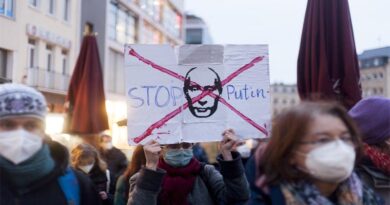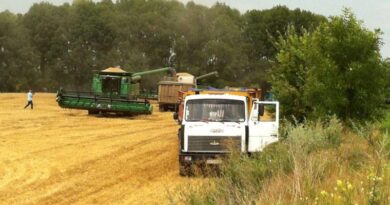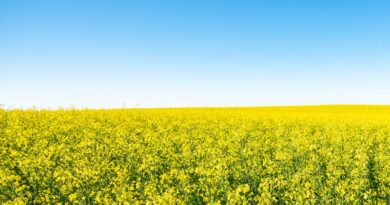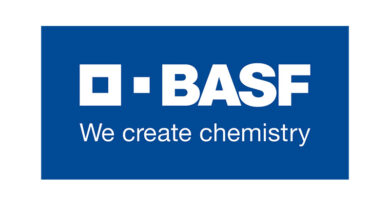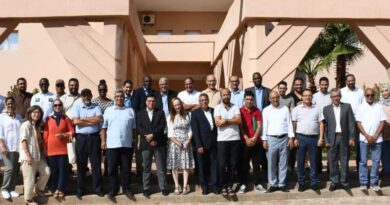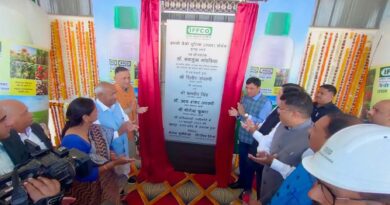One year on: The impact of the war in Ukraine
27 February 2023, Ukraine: One year after Russia’s invasion of Ukraine, three lessons have become apparent: Putin uses food and fertilizers as weapons, Europe must avoid food dependency on Russia and the work to decarbonize the food value chain must accelerate
A year has passed since Russia invaded Ukraine and inflicted excruciating suffering on Ukrainians. The war also has significant implications for other parts of the world. With both Russia and Ukraine being world powers within fertilizers and food, an already mounting pre-war food crisis has accelerated. According to Oxfam International, one person dies of hunger every 4th second[1]. Almost 350 million are facing acute hunger – more than double the number in 2019. More than 800 million people go hungry to bed every night.
This past year, the crucial role of fertilizer has become apparent far beyond our industry, and rightfully so. With half the world population having food on the table due to fertilizers, it’s understandable and fitting that world leaders and the public have become concerned with what happens when farmers are unable to keep their soils fertile due to either affordability or availability of nutrients.
For me, there are at least three major lessons learned from the past year:
1. Putin uses energy, food and fertilizers as weapons
It was apparent early on that Putin uses energy as a weapon, by reducing the supply of gas to Europe. The response has been to reduce the energy dependency and we’ve seen for instance how supply from other countries and also import of LNG have relieved the situation.
However, not as apparent, but equally important, is how Russia also has used food and fertilizers as weapons. Several hundred million are food dependent on Russia and Ukraine, and Putin has used this as a lever. With soaring energy prices, we’ve seen the direct effect on soaring fertilizer prices.
This puts pressure on us as an industry. With high fertilizer prices and parts of the world’s food production in jeopardy, we must make sure that we make every nutrient count. By increasing nutrient use efficiency and improving farming practices, we are helping to de-weaponize Putin and create local resilience. We already have many of the tools needed to achieve more sustainable, efficient farming practices. Solutions don’t have to be invented; they just need to be implemented. Now we need to scale them up – quickly. By using best practices and solutions that exist today, farmers across the world can already significantly reduce nutrients losses. Therefore, low-carbon fertilizers, regenerative agricultural practices and digital tools for precision farming must be incentivized to make food production more resilient and sustainable.
A key challenge to solve is finance. We have to close the climate finance gap and remove harmful subsidies. According to an analysis a few years back from International Fund for Agricultural Development (IFAD), less than 3 percent of climate finance currently goes towards supporting smallholder farmers to adapt to the impacts of climate change[2].
2. Europe must avoid food dependency on Russia
There is a saying that goes like this: “Fool me once, shame on you. Fool me twice, shame on me”.
One can say that Europe was fooled by cheap, Russian gas – or at least underestimated the consequences of that particular dependency. The important thing is to learn from that and avoid new dependencies. Europe simply cannot make the same mistake with food as we did with energy.
We must ensure that Europe does not move towards an era where food production and food resilience is based on imported fertilizers from Russia and other geopolitically unstable regions. Russia is now helping its fertilizer industry to disrupt the competitive market and capture global market share, both inside and outside EU. During the last two seasons, the import of Russian nitrogen to EU increased by almost 30 percent. This can potentially increase the regime’s influence.
If Europe increases its dependency on more carbon-intensive imported fertilizers from Russia and other geopolitically unstable regions, it will not only weaken its strategic autonomy and lead to more food insecurity worldwide, but it will also jeopardize the leading position Europe’s industry has in low-carbon fertilizers. This would significantly increase CO2 emissions globally and could also hinder countries from reaching the Paris climate goals. That is because “Made in Europe” fertilizers have a significantly lower carbon footprint (around 50-60%) compared to most non-EU fertilizers.
Trade politics is now geopolitics – business and politics are two sides of the same coin. Europe must reinforce its strategic autonomy within food and fertilizers. Replacing lost European production with imports reduces what’s available to farmers outside of the region, which would be detrimental for global food security.
3. The work to decarbonize must accelerate
The combination of the energy crisis and food crisis, in addition to the need to reduce dependency on Russia and other unstable countries and regions, cannot be allowed to jeopardize the green transition and the move to a net-zero future. On the contrary, it should give a strong push for the acceleration of decarbonization and nature-positive solutions. We should use the need to reduce dependency on Russia to also reduce emissions and the climate risks.
We are past the point where each country and each company could just capture the low hanging fruits and work in isolation. The UN Secretary General has warned us that we’re on a “highway to climate hell” and it’s clear that only by working together – across sectors – can we succeed to fulfill the Paris Agreement.
This means that we also must tackle the so-called “hard to abate” sectors head on, with fertilizers being one of them. Personally, I have never liked the term “hard to abate”. It’s misleading and creates a barrier for collaboration. “Possible to abate” is a much better term.
When the consultancy group BCG did an analysis of the cost of decarbonizing energy-intensive value chain, they found that it would cost only 4 percent of the total value to decarbonize the food value chain[3]. When we compare that to the massive costs coming if we don’t succeed in reaching the Paris Agreement, those 4 percent are miniscule.
In order make this green transition, renewable energy is key. With enough clean energy, the fertilizer industry will manage to both remove our own emissions and at the same time deliver solutions that will remove emissions in other industries, through for example fossil free fertilizers and fossil free fuel for shipping. From Yara’s side, this is something we are doing as we speak, through our dedicated Yara Clean Ammonia unit and our offering of green fertilizers.
Russia’s invasion has led to devastating losses and suffering for the Ukraine people. Their resilience, also when it comes to doing their utmost to keep growing food, deserves the deepest respect and gratitude. The repercussions are also felt far beyond Ukraine. At the same time, we are faced with the climate emergency that must be resolved. As an industry, we have the possibility and obligation to help alleviate the crisis and bring solutions to the table.
Also Read: Union Budget 2023: An Overview of the Focus on Agriculture
(For Latest Agriculture News & Updates, follow Krishak Jagat on Google News)


